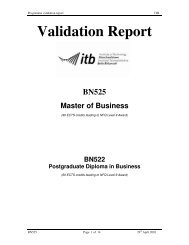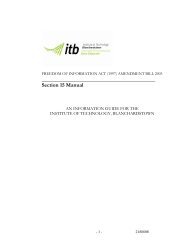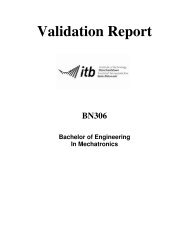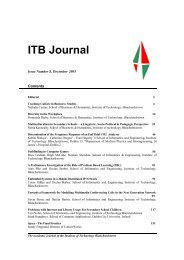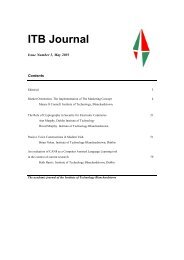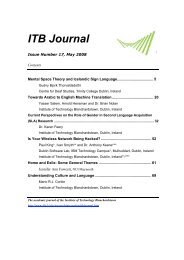ITB Journal-May-2003 - Institute of Technology Blanchardstown
ITB Journal-May-2003 - Institute of Technology Blanchardstown
ITB Journal-May-2003 - Institute of Technology Blanchardstown
You also want an ePaper? Increase the reach of your titles
YUMPU automatically turns print PDFs into web optimized ePapers that Google loves.
<strong>ITB</strong> <strong>Journal</strong><br />
2.1.2 Population Ecology Theory<br />
Population ecology theory (Hannan & Freeman 1977) assumes that the external environment<br />
determines the entire existence <strong>of</strong> a new firm from the beginnings at birth, growth and death.<br />
It takes the population <strong>of</strong> the organisations as the unit <strong>of</strong> analysis and examines the external<br />
environment i.e., structural, economic and political conditions, that lead to the creation <strong>of</strong> new<br />
forms <strong>of</strong> organisations. Hannan & Freeman (1984) propose that organisational death rates<br />
should decline monotonically with age because organisational learning and inertia gradually<br />
increase with age. The emphasis is on the resources in society, not individual motives, nor<br />
decisions or behaviour as the driving force behind the creation <strong>of</strong> organisations. Hence, one<br />
could argue that view contradicts the classic notion <strong>of</strong> the entrepreneur who is regarded to<br />
hold the locus <strong>of</strong> control and determine his or her own destinies. Nevertheless, from what<br />
follows, the population ecology <strong>of</strong>fers a valuable insight into understanding the pluralistic<br />
emergence <strong>of</strong> new firms in industries.<br />
The population ecology approach to explain the birth <strong>of</strong> new firm is a macro perspective <strong>of</strong> the<br />
emergence <strong>of</strong> new organisations and tells very little about the process <strong>of</strong> starting-up at firm<br />
level. The process itself is beyond the individual and firm control (as already mentioned) and<br />
thus this theory gives no insight to understanding the process <strong>of</strong> venture creation at micro<br />
level. However, from a macro perspective it provides insight into the creation and cessation <strong>of</strong><br />
new firms and why and how new organisations emerge in sectors, industries, communities and<br />
economies - an important area <strong>of</strong> study for public-policy makers. Furthermore, this stream <strong>of</strong><br />
population ecological research has provided valuable knowledge into time-dependant patterns<br />
<strong>of</strong> organisational demography, particular for new firms (Van de Ven, 1992). Aldrich (1990)<br />
indicates, the ecological perspective stresses that new firm start-ups are highly dependant on<br />
the macro processes both within and between organisational populations. A body <strong>of</strong><br />
population empirical evidence has demonstrated the consistency <strong>of</strong> this theory across a<br />
number <strong>of</strong> sectors. These include: Newspaper, Automobile, Brewing and Semi-conductor<br />
sectors (Veciana, 1999). The Population Ecology Theory and its supporting empirical<br />
evidence has stimulated scholars <strong>of</strong> entrepreneurship to examine more macro related questions<br />
regarding the factors that influence the rates <strong>of</strong> organisation births and deaths.<br />
Issue Number 7, <strong>May</strong> <strong>2003</strong> Page 21




